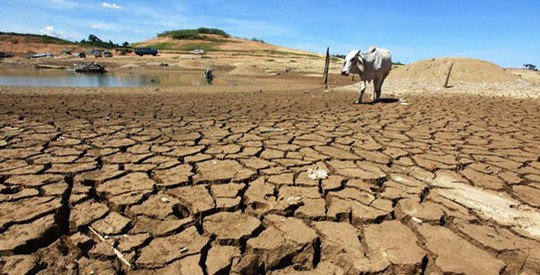
By Adaobi Tricia Nwaubani
ABUJA, Nov 1 (Thomson Reuters Foundation) – When Jackie Farris first watched the climate change documentary “An Inconvenient Truth” on a trip to the United States in 2007, she couldn’t help but wonder: Was global warming creating problems in Nigeria as well?
The film, about former U.S. Vice President Al Gore’s campaign to educate people about climate change in the United States, “was a wakeup call”, Farris said – and led to her investigating what was happening in the country where she moved 15 years ago and has since become a naturalised citizen.
The result is “Nowhere to Run”, an award-winning film that looks at the ties between problems such as expanding deserts, water shortages and sea level rise and threats such as the rise of Boko Haram.
“This film is Nigeria’s ‘Inconvenient Truth,'” Farris said. “It has been an issue for Nigeria that we cannot afford to ignore.”
SHRINKING LAKE CHAD
The film documents the impacts of climate change and environmental degradation in Africa’s most populous nation, including the dramatic decline of Lake Chad, which supplies water to millions of people in Nigeria, Niger, Chad and Cameroon.
The lake has shrunk to just a twentieth of the size it was in 1963 as a result of climate change and growing demands for water for agriculture and other uses, according to the U.N. Environment Programme.
The documentary explores how the shrinking of Lake Chad is affecting families in the northeast state of Borno, the birthplace of the Islamist militant group Boko Haram.
It argues that, frustrated by the disappearance of water and job opportunities, many young people turned to Boko Haram for loans or welfare support, and ended up attending religious classes where they were exposed to extremist beliefs.
“Our most alarming discoveries were desertification, the encroachment of the desert – estimated at six kilometers a year now – and the drying up of Lake Chad,” said Farris, who was born in the United States.
She now heads the Shehu Musa Yar’Adua Foundation in the capital city, Abuja, which aims to inspire generations of Nigerians to a life of service.
After viewing the film, “most people are alarmed”, she said. “They weren’t aware that climate change was having this impact on Nigeria.”
For many Nigerians, “if they know about climate change, it’s from an international perspective. They haven’t connected it with their own society,” she said.
MAKING CONNECTIONS
Amara Nwankpa, the foundation’s coordinator of public policy initiatives, believes that the documentary’s greatest impact has been to turn an abstract international issue into a pressing local one.
According to him, a survey conducted after the film’s premiere revealed that 85 percent of attendees said they didn’t know – until seeing the film – that there was anything like climate change in Nigeria.
“People were making those connections for the first time,” he said.
The film, which premiered in Nigeria in November 2015 and has been shown around the country and in some international settings, will have its full international debut in January when it will be made available to download online.
It has already won the “best documentary short” award at the 2015 African Film Festival in Dallas, Texas.
The documentary was created with Oronto Douglas, a leading environmental human rights lawyer, and Ken Saro-Wiwa Jr., named after his father who was one of Nigeria’s most outspoken environmentalists.
The elder Saro-Wiwa’s activism eventually led to his execution in 1994 by the then military government of Sani Abacha. His son, who narrated the film, died of a stroke in London last month.
Nigeria’s government contributed funding to the film project in 2013, after the Yar’Adua Foundation made the case that climate change was a threat to national security.
“Nowhere to Run” gets its title from a woman interviewed in the film, who described how flooding had disrupted her community in Anambra state in southeast Nigeria, forcing families to move out of their houses and sleep and cook in the streets.
“It was impossible for the community to relocate,” said Patricia Afuberoh, the queen of Ogbakuba community, in the film. “The community has no other land. Where will they now go?… There is nowhere to run to,” she said.
NEW ENVIRONMENTAL PROTECTORS?
Showings of the film in Nigeria have usually been followed by panel discussions that look at the impacts of climate change on the local community.
Nnimmo Bassey, executive director of Nigerian non-governmental group Environmental Rights Action and one of Time Magazine’s 2009 Heroes of the Environment, has also shown the documentary at primary and secondary schools, among other places.
“The younger kids all pledge to be protectors of the environment,” he said, “And that, to me, is the most encouraging outcome.”
Farris and environmental activists say the film has helped forge concern about climate change in a way that years of environmental campaigning have not.
She remembers speaking to a Nigerian woman who told her, after watching the documentary, that she had been attending the World Economic Forum for the past three years and had always regarded the sessions on climate change as her time to grab some rest because she didn’t think it concerned her country.
“This is the level of intelligent, informed, sophisticated global people who are not aware,” Farris said.
(Reporting by Adaobi Tricia Nwaubani; editing by Laurie Goering:; Please credit the Thomson Reuters Foundation, the charitable arm of Thomson Reuters, that covers humanitarian news, climate change, women’s rights, trafficking and property rights. Visit news.trust.org/climate)